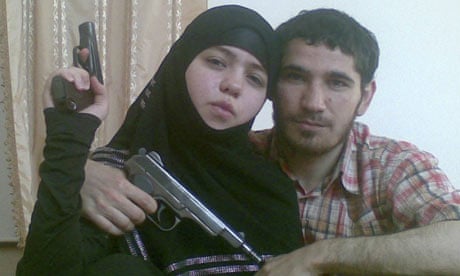It was last week's most haunting image. On one side is 17-year-old Dzhennet Abdurakhmanova; next to her is her young husband, Umalat Magomedov, a militant leader from Russia's Dagestan province whose revolutionary career was cut short last December when government forces shot him dead. They look very much in love. Umalat, also holding a gun, has his arm protectively around her shoulder. With her porcelain features and doll-like face, Dzhennet, pictured, seems almost too gamine to be a genuine terrorist. Last weekend, however, she took an inter-city bus from her home in Russia's north Caucasus to Moscow.
At least one man travelled with her, supplying her with a suicide belt packed with explosives and iron rods. A second suicide bomber went along too. On Monday morning Dzhennet got on to the red line of the metro and set off towards the Kremlin. At Lubykana station she blew herself up, killing more than 20 people. The second bomber, who detonated herself at Park Kultury station, has been tentatively identified as 20-year-old Markha Ustarkhanova from Chechnya. Last October, her militant husband was also reportedly shot and killed. It was the first terrorist attack in Moscow for six years, with 40 dead and more than 70 injured.
Why did Dzhennet do it? The most common explanation is revenge – that like other "Black Widows" who lost husbands or male relatives in the Kremlin's wars in Chechnya, Dzhennet was seeking to avenge the man in the photo. Three days after the bombing, Chechnya's chief insurgent leader, Doku Umarov, claimed the attacks were in reprisal for the killing of Chechen civilians by Russian security forces. Other explanations include coercion, drugs and rape.
But though a precise explanation for Dzhennet's actions can never be known, we shouldn't ignore a simpler reason: the internet. In recent years the insurgency in Russia's north Caucasus has mutated. During the 1990s, the rebels were largely Soviet-educated and secular, seeking to establish their an independent Chechen state. Today's insurgents are radical Islamists, fighting for a Taliban-like emirate across the Caucasus mountains. The web has become a potent tool for recruiting volunteers. According to Kommersant newspaper, Dzhennet and Umalat met while chatting online; at the time she was just 16.
